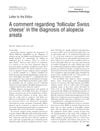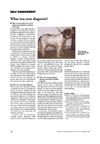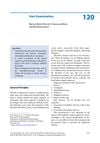 2 citations,
January 2012 in “Journal of Cutaneous Pathology”
2 citations,
January 2012 in “Journal of Cutaneous Pathology” The author clarifies that alopecia areata incognito and diffuse alopecia areata are different types of hair loss with unique symptoms and challenges in diagnosis.
18 citations,
February 2021 in “Dermatologic therapy” Public interest in skin issues changed during COVID-19, with more focus on dry skin, hair problems, and hand eczema.
 3 citations,
July 2016 in “Atlas of the Oral and Maxillofacial Surgery Clinics”
3 citations,
July 2016 in “Atlas of the Oral and Maxillofacial Surgery Clinics” Careful planning and technique in upper facial rejuvenation can minimize risks like hair loss, nerve damage, and scarring.
 December 2021 in “Trichology and cosmetology:”
December 2021 in “Trichology and cosmetology:” Taking Kera-Diet® improves hair and nail health without side effects.
 January 2019 in “Journal of cosmetology & trichology”
January 2019 in “Journal of cosmetology & trichology” L-Cystine and L-Cystine with Kera-Diet® safely improved hair and nail quality in healthy women.
 16 citations,
February 2017 in “Dermatology and Therapy”
16 citations,
February 2017 in “Dermatology and Therapy” The new visual scale is a quick and effective way to measure hair loss in women.
 January 2015 in “Indian Dermatology Online Journal”
January 2015 in “Indian Dermatology Online Journal” The patient's hair loss is most likely due to diffuse alopecia areata.
 5 citations,
November 2008 in “Advances in Dermatology”
5 citations,
November 2008 in “Advances in Dermatology” The review highlights the importance of stem cells in hair health and suggests new treatment strategies for hair loss conditions.
 1 citations,
November 1998 in “Journal of Small Animal Practice”
1 citations,
November 1998 in “Journal of Small Animal Practice” The dog had a Sertoli cell tumor, which was successfully removed with surgery.
 35 citations,
January 1993 in “International Journal of Dermatology”
35 citations,
January 1993 in “International Journal of Dermatology” People with HIV and low T cell counts have more hair and scalp problems.
 8 citations,
March 1979 in “International Journal of Dermatology”
8 citations,
March 1979 in “International Journal of Dermatology” Dr. Vera H. Price's 1979 work emphasizes the importance of accurate diagnosis and personalized treatment for hair loss.
 62 citations,
January 2003 in “Dermatology”
62 citations,
January 2003 in “Dermatology” Sunlight worsens hair loss; protect scalp.
 51 citations,
January 2004 in “Skin Pharmacology and Physiology”
51 citations,
January 2004 in “Skin Pharmacology and Physiology” The document explains hair growth and shedding, factors affecting it, and methods to evaluate hair loss, emphasizing the importance of skin biopsy for diagnosis.
 April 2022 in “Journal of biotechnology and strategic health research”
April 2022 in “Journal of biotechnology and strategic health research” COVID-19 infection may cause hair loss a few months after recovery.
 13 citations,
February 2015 in “Actas Dermo-Sifiliográficas”
13 citations,
February 2015 in “Actas Dermo-Sifiliográficas” The document concludes that recognizing specific histological features of different nonscarring alopecias is crucial for accurate diagnosis and understanding hair loss progression.
 8 citations,
January 2015 in “International journal of trichology”
8 citations,
January 2015 in “International journal of trichology” A woman's total hair loss was linked to a Borrelia infection and was reversed with appropriate treatment.
 1 citations,
January 1967 in “The BMJ”
1 citations,
January 1967 in “The BMJ” The document concludes that while some hair and scalp disorders can be treated, hair loss from destroyed follicles is permanent, and damaged hair can only regrow naturally.
 April 2012 in “Informa Healthcare eBooks”
April 2012 in “Informa Healthcare eBooks” The document concludes that diagnosing hair loss requires evaluating multiple histological features, as no single feature is definitive on its own.
 44 citations,
January 2021 in “Dermatologic Therapy”
44 citations,
January 2021 in “Dermatologic Therapy” COVID-19 may cause hair loss due to infection stress or treatments.
 January 2021 in “Erciyes medical journal”
January 2021 in “Erciyes medical journal” The COVID-19 pandemic changed the types of skin conditions seen at a clinic, with fewer patients and varying numbers of specific conditions.
 4 citations,
April 2022 in “Dermatologic Therapy”
4 citations,
April 2022 in “Dermatologic Therapy” Injecting scalp tissue micrografts is a safe and effective treatment for hair loss after COVID-19.
 14 citations,
April 2017 in “American Journal of Transplantation”
14 citations,
April 2017 in “American Journal of Transplantation” Skin problems from transplant drugs are common and need careful management in organ transplant patients.
 January 2023 in “Skin appendage disorders”
January 2023 in “Skin appendage disorders” Hair loss is common in autoimmune diseases and can be an early sign of the condition, often requiring prompt treatment to prevent permanent damage.

Two nutritional supplements improved hair growth and reduced hair loss in women with hair loss conditions.
 90 citations,
July 2008 in “Dermatologic therapy”
90 citations,
July 2008 in “Dermatologic therapy” Lichen planopilaris is a chronic, scarring hair loss condition with no definitive cure, requiring accurate diagnosis and treatment to manage symptoms.
 January 2018 in “Springer eBooks”
January 2018 in “Springer eBooks” Telogen Effluvium causes more hair loss because hair moves to the resting phase too soon.
 2 citations,
September 2022 in “Cureus”
2 citations,
September 2022 in “Cureus” Almost half of COVID-19 patients in Makkah, Saudi Arabia experienced increased hair loss, especially women and those with chronic diseases.
 January 2015 in “Springer eBooks”
January 2015 in “Springer eBooks” Understanding hair structure and growth is key for diagnosing hair diseases accurately.
 4 citations,
June 2022 in “Indian Dermatology Online Journal”
4 citations,
June 2022 in “Indian Dermatology Online Journal” COVID-19 may cause temporary hair loss due to direct damage to hair follicles, but it usually gets better on its own.
 10 citations,
June 2021 in “BioMed Research International”
10 citations,
June 2021 in “BioMed Research International” Some recovered COVID-19 patients experience skin, hair, and nail issues, suggesting they need follow-up care.




























